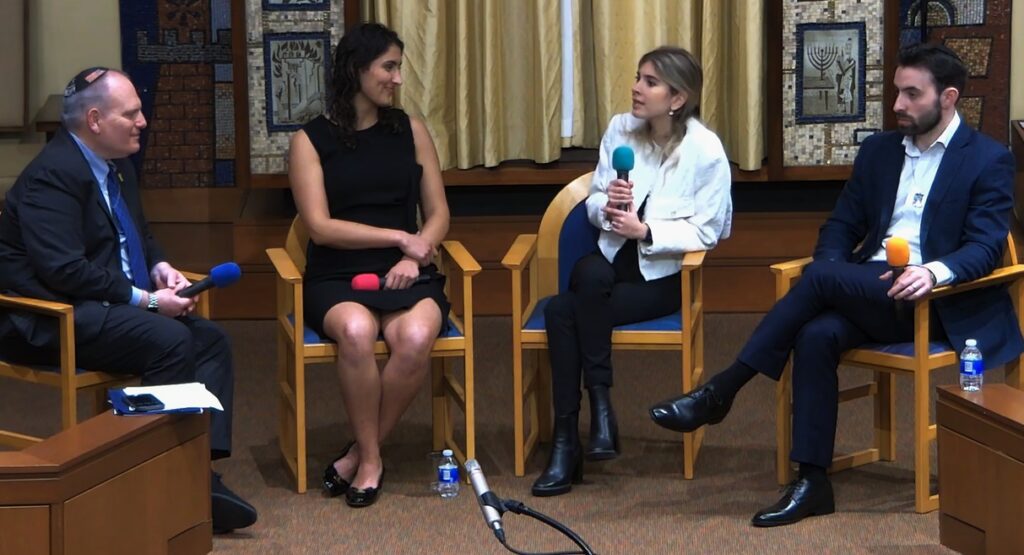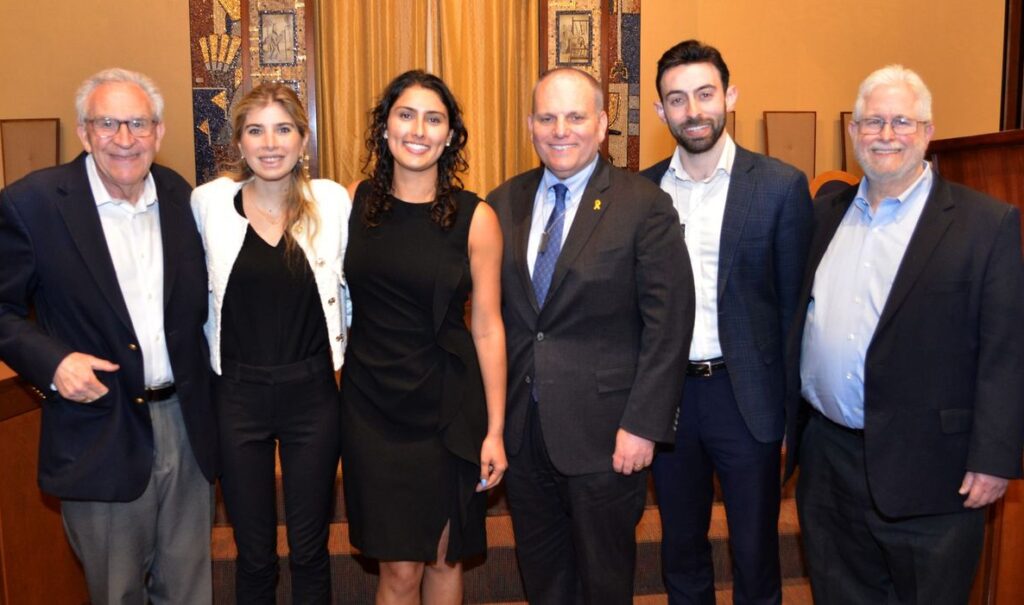Birnbaum4
Left to right: Alan Teperow, Cami Tussie, Talia Khan, William Daroff, Jonathan Frieden and Herbert Birnbaum attend the Connie Spear Birnbaum Memorial Lecture on April 14. Photo by Larry Sandberg
On April 14, the 21st Connie Spear Birnbaum Memorial Lecture featured a program entitled, “Navigating Uncharted Waters: War, Antisemitism, and the American Campus.”
The topic was timely due to the reported rise in antisemitic incidents at many colleges and across the country, including in Newton, following the Oct. 7 attack on Israel and subsequent war.
Around 400 people attended the evening event, both in person and online, held at the Newton Jewish Collaborative Campus in Auburndale, in partnership with Temple Reyim and Hebrew College. A musical program of Jewish music presented by the Zachor Choral Ensemble alternated with speakers.
The Birnbaum Lecture Foundation was established to honor the legacy of Connie Birnbaum, who was active with the Synagogue Council of Massachusetts on enhancing Jewish unity. The Foundation’s website states, “Through our work, since 2004, we have strived to model for the Jewish community and beyond how much can be gained by embracing what we have in common rather than allowing our differences to divide us.”
William Daroff
The main speaker, William Daroff, CEO of the Conference of Presidents of Major American Jewish Organizations, was in conversation with three student activists, emphasizing the need to address anti-Semitism while promoting dialogue within the Jewish community and with the wider society. Short presentations were made by Rabbi Daniel Berman of Temple Reyim, Rabbi Gita Karasov of Hebrew College, and Alan Teperow of the Birnbaum Foundation. In Daroff’s forceful address, he asserted that while Jews have lived in relative safety in the U.S. for centuries, recent events have shown that anti-Semitism is increasing, particularly on college campuses. He stated that 25% of American Jews reported experiencing antisemitism in 2023.
Noting that there has been a corresponding increase in Jewish pride, Daroff asserted that the Jewish community, “will not rest while our students are being persecuted.” He described the need to stand up against anti-Semitism and ensure consequences for the people involved.
Daroff then moderated a panel discussion with three Boston-area campus activists.
Talia Khan
Talia Khan is a graduate student in Mechanical Engineering at MIT and the graduate student president of the MIT Israel Alliance. She described how over the last year, she has gone from being on a normal university campus to feeling like she is on the edge of war, especially with the active promotion of the Boycott, Divest, and Sanctions (BDS) movement against Israel. She reported that, “Regardless of whether you wanted to be involved, you had no choice.”
Cami Tussie
Cami Tussie is a student at the Harvard School of Dental Medicine and president of the Maimonides Society of the Harvard Medical and Dental Schools. She described how the current Diversity, Equity, and Inclusion (DEI) movement on campus has shifted Jews into the category of “oppressors” while Palestinians are regarded as “oppressed.” Cami reported that while she used to have close Muslim friends, they won’t speak to her now because she is Jewish.

Jonathan Frieden
Jonathan Frieden is a graduate student at the Harvard Law School and president of the Alliance for Israel at the Harvard Law School. Frieden described how Jewish events on campus were disrupted by protesters without consequences. When Jewish students argued for positions of unity and consensus during political meetings, other students responded, “We don’t want to be united with people like you.” He spoke about problematic situations where the vocal opposition to Israel’s actions by small groups of Jews were used to justify anti-Semitic positions.
The conversation ended with an emphasis on reaching out to elected representatives, and to other Jewish students so they don’t feel alone. Frieden summed up by saying, “In times like this, when things are scary, it is important to stand up for who we are.”
